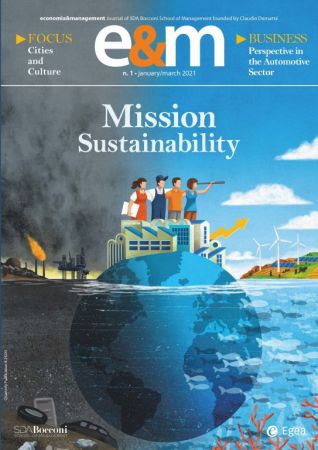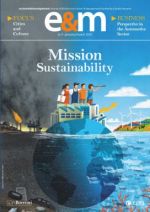E&M
2021/1
When a Trademark Transforms the Value Chain
Those who work as CEOs today deal with sustainability every day, in every decision they make and every action they carry out: from the management of factories to innovation, from human resources to communication. Each company should be based on a single purpose, given by the integration of its own purpose and a social purpose. This integration between economic and social mission defines a clear model of management towards a sustainable future; a model constantly searching for balance between value shared with the consumer, the society, and the planet, where the value of authenticity rises to the top. The challenge of sustainability can be won only if we are able to work as a system between businesses and the main NGOs defending the environment and people. This encounter can produce moments for the exchange of know-how, relations, understanding of phenomena, and shared, concrete working plans.
Rio Mare has been working for years to preserve the marine ecosystem, making a commitment to future generations that is ethical, but also indispensable to guarantee its own business model. In collaboration with leading environmentalist organizations, such as Greenpeace, and thanks to a transformational partnership with the WWF, various programs have been launched for the adoption of more sustainable fishing practices and traceability of the supply chain, in accordance with the leading standards today, such as those established by the Marine Stewardship Council.
Rio Mare, the leading brand in Europe in the tuna sector, has become a champion of sustainability, radically transforming its value chain: from raw materials to production, to the relationship with end consumers.
Giuseppe Morici, now the head of Bolton Group, an Italian multinational that manages a portfolio of more than 50 brands (Rio Mare, Simmenthal, Borotalco, Neutro Roberts, Collistar Omino Bianco, and UHU) in different sectors (food, personal care and cosmetics, home care and adhesives), spoke to us about how the protection of natural resources and attention to social themes are vital elements for every business, and how a business leader can have an impact on the path to a more sustainable society.
For a business, what does it mean to deal with sustainability today? And how is it different from the past?
The meaning of sustainability and the way businesses operate in this context have changed deeply over time. In a not-so-distant past, many "responsible" entrepreneurs dealt with sustainability adopting a philanthropic attitude, almost of making amends. Social responsibility was manifested with social and cultural actions, that were commendable, but almost always foreign to the company's model of value creation, in which little or nothing changed. It was the constant growth of environmental sensitivity that put the business and its activities at the center of the debate, and thus led to a shift. Sustainability, for which I really like to use the French word durabilitè (durability), because it gives the idea of what the final goal of the efforts is, has a profound impact on a company's business model today. It has nothing to do with compensation, but is centered on the future, with the search for a balance between business activity and the needs of the society and the planet. As a consequence, the professions of sustainability have changed. Yesterday social responsibility managers were figures for external communication and public relations. Today, those who deal with sustainability enter businesses and stick their hands into its strategic and operational points, from factories to innovation, from recruiting to advertising. It can be said that those who work on sustainability in companies today essentially do the work of a CEO.
There is much talk of "purpose" and "authenticity." Why are these factors increasingly important in determining the success of businesses?
First of all, let us clarify that every business has a purpose, whether it is conscious of it or not, independent of sustainability. The purpose if the "sacred fire" that led the founder to create the company and is often linked to the product conceived by that person. The purpose, that unfortunately is sometimes lost over time, has recently been joined by the "social purpose," one of the fundamental dimensions of social responsibility. I believe that recognizing the existence of these two purposes is a fundamental juncture in the evolution of corporate social responsibility. I am convinced that the best service a company can do for society is to align the two purposes in a single one. This single mission will determine a clear model of management towards a sustainable future; a model constantly seeking a balance between value shared with the consumer, society, and the planet. When, however, the two purposes are stratified and different, there is a risk of keeping sustainability separate from the life of the business, and limiting interventions to philanthropic initiatives, that by themselves do not have the power to transform our future and safeguard the planet's resources. In the worst cases, the misalignment of the purposes can generate greenwashing, since the business is not able to generate a true change in its activities.
Aligning the purpose is not an easy exercise, but a powerful process that activates energy, intellectual, moral, and economic resources, and when it succeeds, the company truly becomes a champion of social change, without forgetting its economic role. This is an important aspect, which nobody should be ashamed of: if the company is not solid and profitable, does not invest, and does not create jobs, it is not, and cannot be, a sustainable business. Economic solidity is the precondition for developing one's own social role.
It is in this alignment of the two purposes where, in my view, the authenticity of a business lies; a fundamental value in a world that, thanks to digital interaction and social media, is increasingly transparent. In a company that identifies with a single purpose generated by the integration of the economic and social missions, everyone works consistently towards this goal. Whoever decides to examine the underlying traits of the people who work in a company, the management, ownership, and products, will recognize the same elements of authenticity.
In a difficult moment in history such as this, the crisis generated by Covid-19 seemed able to push issues such as the fight against climate change, gender equity and inequality into the background. Yet for many stakeholders – citizens, policymakers, and investors – sustainability has become even more central and important. Why do you think this is?
As I explained recently at a conference organized by the WWF, the clean water of Venice and the roe deer in the streets of the cities or the clean skies of China, as well as those of the Po Valley during the first lockdown, posed questions to all of us. The planet demanded attention. I don't at all mean to downplay or give a fictionalized interpretation of the terrible tragedy we have suffered. But I believe that we can no longer ignore the breakdowns of society and the environment caused by our model of development. Before this could be foreseen, during a conference I gave a speech that I entitled: "What if we all stopped?" I vehemently argued that our routine no longer made sense, and that it was necessary to rediscover the deeper meaning of our job as business leaders. I believe that the global crisis due to Covid-19 has accelerated many trends already underway, and has deepened the debate within companies on the issue of sustainability. And this has taken place because all of us have realized that it is not a question of adjusting things, or improving them. It's about changing the model; the one inherited from our parents is no longer acceptable. We now understand this. Perhaps our children will invent a new one, if we make it possible for them to do so.
We often see leaders and businesses enter the arena to support social and environmental causes (think of Tim Cook, on LGBT or racial issues; Paul Polman on the environment and climate; and Emmanual Faber, on food as a right, GMOs and health). What is your opinion of this "quasi-political" activism? Is this a valid and effective way to make capitalism more sustainable and fair? Is it functional to the creation of value?
First of all, I will say that for me politics is the highest form of civil service one can perform for the community. However, I believe that leading a business is a different profession. Leading a complex, multinational business community entails a responsibility that is almost political, but it is a responsibility that remains within the company. The values that inspire the organization guide its behavior and influence the daily life of hundreds of thousands of people (our employees, consumers, suppliers, etc.). CEOs do have a civic, almost political responsibility, but I believe that they have it above all within their companies. Before taking a public position on a social issue, as a CEO I prefer to have done everything, really everything, to ensure that the issue is felt strongly within every corner of my company. CEOs speak with facts, not tweets. And if I have to choose a type of activism, let's say that I prefer the social activism of brands to the political activism of CEOs.
Starting from your experience as a leader and CEO, what are the most difficult challenges to seize the opportunities linked to sustainability? Which stakeholders are the most resistant to change? Which are the most favorable?
I am a fortunate CEO, because I have always worked in situations where the good of the company has been pursued with intellectual honesty and good faith. In these contexts, the principal problem in terms of environmental sustainability, for example, is not costs, as many imagine based on an anti-industrial prejudice. The problem is often linked to feasibility. Many times, finding sustainable raw materials is not a question of desire, but of feasibility.
Often, succeeding in industrializing products with new raw materials or more sustainable packaging is also not a question of desire, but of technology. So there is also an issue of systems and infrastructure that must addressed.
I have never met reticent stakeholders. I have met many people of good will committed to making possible what initially seems impossible. This is the job of the innovator, that often requires vision, obstinacy, risk, and effort. This time we have to apply it to sustainability. That's all.
We know that very often the environmental and social impact of our products and services depends on actions along the value chain (from the supply chain to consumer behavior). With Rio Mare you have insisted a great deal on a sustainable transformation of the value chain. What successful actions did you take? What still needs to be done?
In my view, there were two winning moves by Rio Mare and the group's other international brands in the tuna sector: the first, more than ten years ago, was to be founding members of the International Seafood Sustainability Foundation (ISSF). This NGO, now supported by the global leaders in the fishing sector and by the best-known foundations, is now the global reference point for the tuna industry in terms of sustainability. The ISSF makes use of the support and knowledge of the WWF and the best scientists and marine biologists. Science and research are the strong point of the organization, which has an annual budget of over 10 million dollars.
The second move that strengthened Bolton's leadership on the issue of sustainability is linked to the decision to form strategic partnerships with important stakeholders: first with the WWF, on the environmental side, and now with Oxfam,[1] on the social side.
These two moves opened the doors of our organization to the outside. Thanks to these choices, we demonstrated interdependence with our partners and humility, accepting, rather than avoiding accountability. The problems we want to solve are global, gigantic. Do we really think we can do it alone? And if what we really want is to help society and the planet face the challenges of the present, do we think our sustainability strategy can be competitive? No, it must be inclusive, because we can only make it together: "Partnership is our leadership."
Much remains to be done. The sustainability of fishing activities is not a goal to be reached once and for all. It is a daily challenge in the four corners of the planet, and guaranteeing the compliance of all the activities for increasingly sustainable fishing is a mammoth effort. And then there is the environmental impact of factories, packaging, social justice, and respect for human rights along the value chain. Sustainability is a process. This must not be an alibi, because the longer the path, the more determined the stride must be.
How can the partnerships with organizations such as the WWF e Oxfam help a business on the path to sustainability?
The principal NGOs, like WWF and Oxfam, are aware that to deeply change things, it is necessary to work as a system and do things together with businesses, not against them. The most careful organizations do not take a hostile position, but open up discussions. These discussions lead to exchanges of know-how, relationships, understanding of phenomena, and shared and realistic working plans. NGOs are critical but collaborative partners, who help us to identify potential areas of social and environmental risk, share best practices and experiences already gained in other fields with other companies, and suggest scientific partnerships to resolve technical problems. They thus have the dual role of prodding and being critical observers, but they are also contributors and facilitators of change, and above all, they constantly monitor our progress.
A company like ours, that sets ambitious goals on the theme of sustainability, needs to interact with all of those who are committed to the same goal, and the NGOs have an interest, as we do, in traveling this road together.
The Bolton Group is a company that has many brands and operates in many sectors. What are the three main challenges today, and tomorrow?
I would like to see the Bolton Group, as a large Italian industry in the world, succeed in adopting a balanced view of the economy, a human view of the economy, in which, as has happened for centuries, the economy is at the service of people, not the contrary.
This vision is strongly shared by the group's entire Board, and in particular by Marina Nissim, our chairwoman, who for years has been a promoter and spokeswoman for a new model of development, able to integrate the growth of the group with the sharing of value.
There are many challenges we must face to fulfill the expectations of this ambitious mission: the first is to preserve the resources of the planet and thus the sustainability of our raw materials and fishing activities; the second is the environmental sustainability of our packaging; and the third is social justice along our production chains.
When industrial companies developed to their current size, they removed millions of people from misery and the hardships of the countryside that we now idealize, but where living conditions were often below the minimum standards of civilization. Now, at the end of this phase of industrial development, we must return to the social mission of our businesses: to provide work and dignity. And, in an era in which having decent job is no longer so obvious, for us at Bolton Group, and here I intend to express to the view of the Board and all of the people in the Group, must return as a priority. Not only in the corners of the world in which we have far-off industrial operations and where local standards are not advanced, but also here in Italy.
Synopsis
- Those who work as CEOs today deal with sustainability every day, in every decision they make, and in every action they carry out: from the management of factories to innovation, from human resources to communication. Sustainability pervades all of the corners of the business and conditions all of its activities.
- Each company should be based on a single purpose, given by the integration of its own purpose and a social purpose. This integration between economic and social mission defines a clear model of management towards a sustainable future; a model constantly searching for balance between value shared with the consumer, the society, and the planet, where the value of authenticity rises to the top.
- To face the challenges of sustainability, more than the resistance or prejudice shown by some, it is important to resolve the problems linked to the technological and organizational feasibility of some operations (for example, finding materials with less environmental impact). It is a question of innovation and infrastructure.
- The challenge of sustainability can be won only if we are able to work as a system between businesses and the main NGOs defending the environment and people. This encounter can produce moments for the exchange of know-how, relations, understanding of phenomena, and shared, concrete working plans.
Oxfam (Oxford Committee for Famine Relief) is an international confederation of non-profit organizations that are dedicated to reducing global poverty through humanitarian aid and development. For more information on the Italian affiliate see the website https://www.oxfamitalia.org/.




